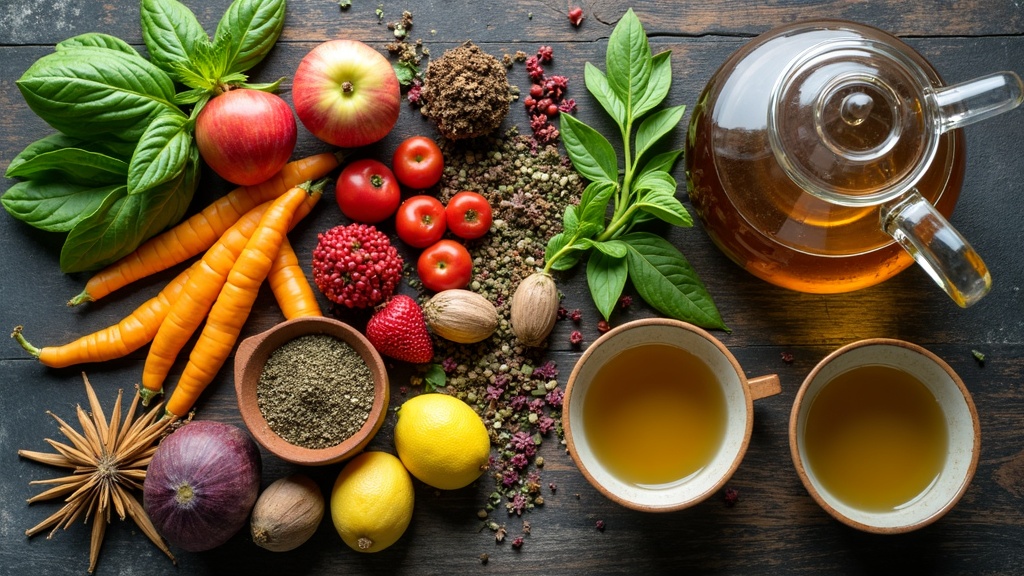Inflammation can easily sneak up on you, whether it’s sore joints after a workout, a puffy ankle from a twisted step, or just that sluggish feeling from chronic stress. I’ve spent a lot of time checking out what actually helps calm things down naturally, since so many folks want options they can try at home before reaching for medicine. Natural remedies for inflammation show up in all shapes, from foods to lifestyle tweaks, and their benefits can really go a long way, especially for ongoing issues like arthritis or general aches.

Understanding Inflammation: What’s Actually Happening?
Inflammation is your body’s way of dealing with injury or germs. Sometimes it sticks around longer than needed, and that’s where trouble starts. Think of it more as a response than a condition itself. Acute inflammation happens fast—with redness, swelling, and pain after a sprain or bug bite, for example. Chronic inflammation builds up over time and can make life tougher by adding tiredness, joint pain, or more serious diseases such as diabetes and heart issues.
The five classic signs of inflammation are:
- Redness: Blood rushes to the area.
- Heat: The spot might feel warm to the touch.
- Swelling: Fluid gets trapped in tissues.
- Pain: Sensitivity or discomfort kicks in.
- Loss of function: It can be harder to use the affected part.
It’s pretty handy to know these signs. They can help you decide when something might just need a little rest and some simple remedies, or when it’s time to talk with a healthcare provider.
Powerful Natural Anti-Inflammatories Worth Checking Out
The question I hear most: “What is the most powerful natural anti-inflammatory?” Turmeric grabs the spotlight, and for good reason. The curcumin in turmeric acts fast on several pathways in the body that cause inflammation. I sprinkle turmeric on stir fry, toss a little in scrambled eggs, or mix it into smoothies. Black pepper helps your body absorb the curcumin, so a pinch of pepper goes a long way.
But turmeric isn’t the only major player. Several other strong natural anti-inflammatories include:
- Ginger: Super useful for joint pain or an upset stomach. Try ginger tea, add grated ginger to stir fry, or mix it into smoothies.
- Green tea: Packed with antioxidants called catechins, which target inflammation. Enjoy it hot or cold, or make matcha for an extra boost.
- Omega-3, fatty acids: Found in flax seeds, walnuts, and especially fatty fish, these are pretty handy for long-term inflammation management.
- Blueberries and other berries: They’re filled with antioxidants and make a sweet snack or smoothie booster.
- Boswellia (frankincense): Often found in supplements and works on joint inflammation, especially for people with arthritis.
Each of these has its own way of helping calm down inflammation. Mixing them up throughout your week can make a noticeable difference over time, offering your body a steady supply of anti-inflammatory support from a variety of sources.
Friendly Foods That Fight Inflammation
Taming inflammation often starts in the kitchen. I switch up my meals to include ingredients that help soothe my system, and over time, I’ve really noticed less stiffness and more energy. These foods keep showing up on my plate:
- Leafy greens: Think spinach, kale, and collards. Toss them into soups, omelets, or blend them into smoothies for a natural nutrient boost.
- Colorful veggies: Peppers, carrots, and beets add flavor and are simple to roast as a side or include in salads.
- Nuts and seeds: Just a small handful of almonds, walnuts, or chia seeds can ramp up your intake of healthy fats.
- Olive oil: Great for salad dressings or drizzling over roasted veggies. Extra virgin olive oil also brings powerful antioxidants to the table.
- Garlic and onions: Use them as a flavor base for most meals. They are super easy to work into daily cooking.
Staying away from refined sugars, fried foods, and too many processed snacks also makes a big difference. Remember, every small switch adds up over time, so don’t underestimate even simple changes in your daily food routine.
them
Simple Daily Habits to Help Heal Inflammation Naturally
Natural remedies aren’t just about what you eat. Everyday habits make a difference too. Here are some things I work into my routine:
- Move your body: Even a short walk loosens up stiff areas and boosts circulation. You don’t need to run a marathon; consistency matters most.
- Get enough sleep: Quality rest helps your body repair itself and keeps inflammation down. Try to keep a regular sleep schedule.
- Manage stress: Breathwork, meditation, or just listening to music slows the body’s stress reactions. Keeping a gratitude journal or simply sitting quietly for a few minutes can help more than you think.
- Stay hydrated: Water flushes out toxins and helps your joints move smoothly. Add a squeeze of lemon or fresh mint for flavor if plain water is boring.
- Make time for gentle stretching or yoga: Eases muscle tension and can help stop inflammation from getting worse. Just a few minutes a day can bring benefits.
Small lifestyle tweaks like these are easy to overlook, but together they stack up to help your body stay in a calm, balanced state.
Top Drinks for Reducing Inflammation
Swapping out sugar-heavy drinks for something that soothes your system can really help. The number one best drink to reduce inflammation? Green tea gets my vote. It’s loaded with antioxidants, easy to find, and quick to make at home or carry in a thermos. Herbal teas like ginger or turmeric tea are also easy to brew and bring their own anti-inflammatory bonuses.
- Green tea: Helps cool inflammation from the inside and is gentle on the stomach. Enjoy it plain or with a slice of lemon.
- Turmeric tea (golden milk): Warm milk or plant milk with turmeric, black pepper, and a dash of honey. It’s comforting before bed, too.
- Ginger tea: Zesty and helpful after a meal or in the evening for relaxation.
- Freshly made berry smoothies: Use unsweetened almond milk, a handful of spinach, and a cup of berries for a potent, tasty drink loaded with antioxidants.
- Lemon water: An easy way to start the day with hydration and a vitamin C boost. This basic drink is the simplest anti-inflammatory out there.
These drinks are easy to switch in for soda or sugary juices, and they’re tasty enough to keep around all week. If you like variety, try rotating different teas and smoothie ingredients to keep things interesting while giving your system a steady lineup of anti-inflammatory helpers.
Things You Should Know Before Starting Any Natural Remedy
Natural doesn’t always mean risk-free. Some herbs or supplements can interact weirdly with medications or have side effects if you already have health conditions. If you’re trying something new, like supplements or strong herbal teas, it’s smart to chat with your doctor, especially if you’re on medication for a chronic illness.
- Start slow: Add one new food or supplement at a time so you can watch for any strange reactions.
- Read ingredient labels: Some “natural” supplements use fillers or unwanted additives, so it pays to check the details.
- Stay skeptical about big claims: If something promises a “miracle cure,” it’s worth checking with a trusted source first. Look for studies or advice from professionals.
Careful research helps buyers make informed decisions. The goal with any remedy, natural or not, is steady, long-term better health, not chasing overnight fixes or all-or-nothing solutions.
Turmeric: My Go-To for Soreness and Swelling
If I start to feel stiff or sore after a workout, I’ll whip up a cup of golden milk (turmeric, black pepper, and a splash of almond milk) or sprinkle turmeric in my soups. Over time, my joints settle down faster. Friends with arthritis have also mentioned how useful turmeric is when taken daily, sometimes paired with bromelain or black pepper in supplement form. Just watch for stomach upset, as too much turmeric can bother some people.
Fish Oil and Omega-3 Fatty Acids
Fatty fish like salmon and mackerel are regulars at my dinner table for a reason. Omega 3s from these foods keep joint aches quieter and even seem to help with focus and mood. Vegetarian options like flaxseed oil or chia seeds are solid too, although it takes a bit more to get the same anti-inflammatory impact as from fish oil capsules. Incorporate these healthy fats into salads, oatmeal, and dips for a sustainable nutrition boost.
Advanced Tips for Making Natural Remedies Part of Your Routine
Consistency makes a difference with natural remedies. I get the best results when I work anti-inflammatory foods into every meal and keep up with daily movement and hydration. A supplement here and there helps, but the habits you build up matter most in the long run.
- Batch prep anti-inflammatory teas or smoothies: Keep pitchers in the fridge for a quick grab-and-go option, so there’s always something healthy ready.
- Plan meals grab-and-go: Toss veggies in olive oil, roast a big batch, and sprinkle on some turmeric or garlic for double benefits. Prepping meals in advance helps you avoid falling back on processed food when you’re busy.
- Stay flexible: Your needs might switch up with the seasons or your activity levels, so adjust your routine as needed. Listen to your body’s feedback to make the best choices.
I’ve noticed it helps to keep a journal for a few weeks, noting what I eat, how I feel, and anything I’m adding or changing. It’s a simple way to see patterns and figure out which remedies actually work best for you. Over time, you’ll spot which foods or habits give you the biggest boost, and you can tweak your routine as you go.
The Bottom Line: Building an Anti-Inflammatory Lifestyle
Natural remedies for inflammation aren’t just about a single superfood or one habit. More often, they’re really a combination of simple daily choices: what you eat, how you move, and the ways you manage stress. Turmeric, ginger, and omega-3somega-3s are solid picks to start with, while hydration and sleep are super important for healing from the inside out. If you’re just getting started, green tea is a soothing (and proven) option to try first. Don’t overlook the power of colorful veggies, steps to manage stress, and swapping out processed snacks. Every little switch moves you closer to feeling better with fewer aches and a whole lot more energy for everything you love to do. Remember, lasting change is about steady, intentional decisions made each day.
Frequently Asked Questions
Question: What is the most powerful natural anti-inflammatory?
Answer: Turmeric is widely considered the top choice, thanks to its active compound, curcumin, which is super useful for calming inflammation throughout the body.
Question: How to heal body inflammation naturally?
Answer: Mix up a diet rich in fruits, veggies, and good fats; cut out processed foods; move your body daily; get enough sleep; and manage stress. Turmeric, ginger, and omega-3s are especially effective for many people.
Question: What is the #1 best drink to reduce inflammation?
Answer: Green tea tops the list because of its high level of antioxidants, but herbal teas featuring turmeric or ginger are also great choices.
Question: What are the 5 classic signs of inflammation?
Answer: Redness, heat, swelling, pain, and reduced function or trouble using the affected area are the main signs doctors look for.
